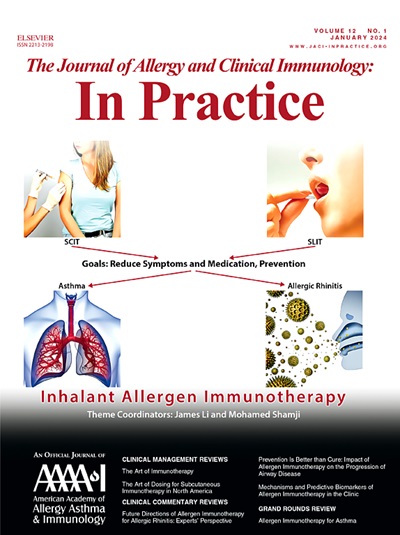The Immediate and Delayed Maximal Nonirritating Skin Testing Concentrations of β-Lactam Antibiotics
IF 8.2
1区 医学
Q1 ALLERGY
Journal of Allergy and Clinical Immunology-In Practice
Pub Date : 2024-11-01
DOI:10.1016/j.jaip.2024.07.022
引用次数: 0
Abstract
Background
Maximal skin testing (ST) nonirritant concentrations (NICs) are consistent for penicillin and aminopenicillin among guidelines. However, there is variability among guidelines for maximal ST NICs of cephalosporins.
Objective
To determine maximal immediate and delayed ST NICs of 15 β-lactams in β-lactam-tolerant and β-lactam-naïve participants.
Methods
We performed a single-center, nonrandomized prospective study between September 2019 and January 2022 in adult participants. Participants received skin prick testing (SPT) and intradermal test (IDT) injections at 6 increasing concentrations of 1 or more β-lactams. A concentration was considered irritant when more than 5% of participants had a positive test. A positive test was defined as a wheal ≥3 mm compared with negative control accompanied by a ≥5 mm flare for SPT/IDT and induration ≥5 mm with associated erythema at 48 hours for delayed readings (dIDT). Sensitivity analyses using 3 alternative IDT positive criteria were conducted.
Results
A total of 747 participants with a median age of 64 (interquartile range: 54-72) years (52% male, 85% White, and 92% non-Hispanic) underwent 20,858 skin tests. All undiluted SPT concentrations were nonirritant. We found the following maximal IDT/dIDT NICs (mg/mL): ampicillin (41.6/125), ampicillin-sulbactam (93.8/187.5), aztreonam (6.3/25), cefazolin (55/165), cefepime (35/140), cefoxitin (45/90), ceftaroline (7.5/15), ceftriaxone (58.3/175), cefuroxime (55/110), ertapenem (16.6/50), imipenem-cilastin (6.3/25), meropenem (8.3/25), nafcillin (31.3/62.5), oxacillin (20.9/83.5), and piperacillin-tazobactam (112.5/225). dIDTs were almost all completely nonirritant close to or at undiluted concentrations. There were no differences when we applied 3 IDT positivity criteria to our raw data.
Conclusions
Our results suggest that SPTs with undiluted stock β-lactam antibiotic concentrations are nonirritant. Compared with previously published nonirritant concentrations, we propose a 2- to 50-fold increase to the maximal IDT and dIDT NICs of 15 β-lactam antibiotics. When performing dIDTs, a higher concentration should be used rather than the same IDT concentration.
β-内酰胺类抗生素的即时和延迟最大非刺激性皮试浓度。
背景:各指南中青霉素和氨青霉素的最大皮试无刺激浓度(NIC)是一致的。然而,不同指南对头孢菌素的最大 ST 无刺激性浓度(NIC)的规定存在差异:目的:确定 15 种β-内酰胺类药物在耐受β-内酰胺类药物和未耐受β-内酰胺类药物的参与者中的最大即时和延迟 ST NIC:我们在 2019 年 9 月至 2022 年 1 月期间对成年参与者进行了一项单中心、非随机前瞻性研究。参与者接受了皮肤点刺试验(SPT)和皮内试验(IDT)注射,注射浓度为六种递增的一种或多种β-内酰胺类药物。当超过 5%的参与者测试结果呈阳性时,该浓度被认为具有刺激性。SPT/IDT阳性试验的定义是:与阴性对照组相比,出现≥3毫米的皮疹并伴有≥5毫米的皮疹扩展;延迟读数(dIDT)阳性试验的定义是:48小时后出现≥5毫米的压痕并伴有红斑。使用 3 种不同的 IDT 阳性标准进行了敏感性分析:共有 747 名参与者接受了 20,858 次皮试,他们的中位年龄为 64 岁(IQR 54-72),52% 为男性,85% 为白人,92% 为非西班牙裔。所有未稀释的 SPT 浓度均无刺激性。我们发现了以下最大 IDT/dIDT NIC(毫克/毫升):氨苄西林(41.6/125)、氨苄西林-舒巴坦(93.8/187.5)、阿曲南(6.3/25)、头孢唑啉(55/165)、头孢吡肟(35/140)、头孢西丁(45/90)、头孢他啶(7.5/15)、头孢曲松(58.dIDTs在接近或未稀释浓度时几乎都完全无刺激性。当我们对原始数据采用 3 种 IDT 阳性标准时,结果并无差异:我们的研究结果表明,使用未稀释的β-内酰胺类抗生素原液的 SPT 无刺激性。与之前公布的无刺激浓度相比,我们建议将 15 种 β-内酰胺类抗生素的最大 IDT 和 dIDT NIC 提高 2 到 50 倍。在进行 dIDT 时,应使用更高的浓度,而不是相同的 IDT 浓度。
本文章由计算机程序翻译,如有差异,请以英文原文为准。
求助全文
约1分钟内获得全文
求助全文
来源期刊

Journal of Allergy and Clinical Immunology-In Practice
ALLERGYIMMUNOLOGY-IMMUNOLOGY
CiteScore
11.10
自引率
9.60%
发文量
683
审稿时长
50 days
期刊介绍:
JACI: In Practice is an official publication of the American Academy of Allergy, Asthma & Immunology (AAAAI). It is a companion title to The Journal of Allergy and Clinical Immunology, and it aims to provide timely clinical papers, case reports, and management recommendations to clinical allergists and other physicians dealing with allergic and immunologic diseases in their practice. The mission of JACI: In Practice is to offer valid and impactful information that supports evidence-based clinical decisions in the diagnosis and management of asthma, allergies, immunologic conditions, and related diseases.
This journal publishes articles on various conditions treated by allergist-immunologists, including food allergy, respiratory disorders (such as asthma, rhinitis, nasal polyps, sinusitis, cough, ABPA, and hypersensitivity pneumonitis), drug allergy, insect sting allergy, anaphylaxis, dermatologic disorders (such as atopic dermatitis, contact dermatitis, urticaria, angioedema, and HAE), immunodeficiency, autoinflammatory syndromes, eosinophilic disorders, and mast cell disorders.
The focus of the journal is on providing cutting-edge clinical information that practitioners can use in their everyday practice or to acquire new knowledge and skills for the benefit of their patients. However, mechanistic or translational studies without immediate or near future clinical relevance, as well as animal studies, are not within the scope of the journal.
 求助内容:
求助内容: 应助结果提醒方式:
应助结果提醒方式:


